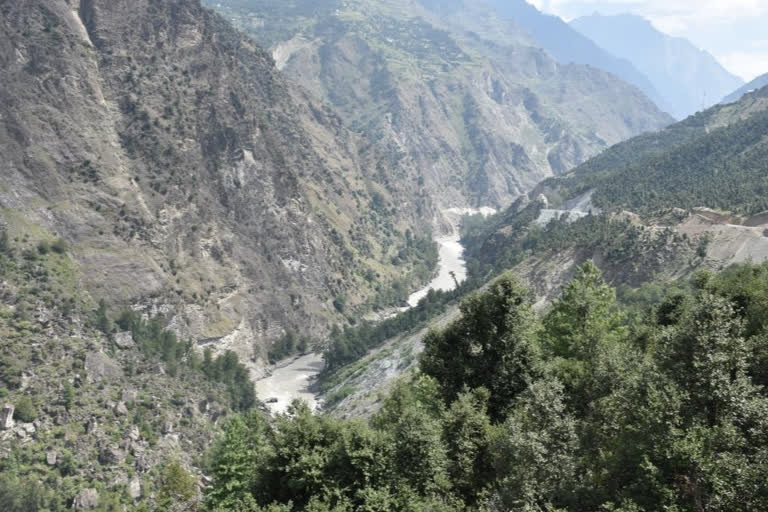New Delhi: After a gap of two years, the top officials of India and Pakistan are slated to hold a two-day meeting beginning March 23 to discuss the Indus waters issue. The meeting which is an annual event between the two Indus Commissioners is scheduled after the nullification of Article 370 that gave special status to Jammu and Kashmir.
The meeting comes at a time when the ties between the two neighbouring countries have become crucial. Nevertheless, over the past few months, Pakistan has shown some positivity in normalizing the relations between the two countries. On the other hand, New Delhi has always maintained to normalise the relation with Islamabad. In fact, over the past few weeks, the two governments have made efforts to maintain peace at the borders areas and to reinitiate the peace talks.
Now it remains to be seen whether the discussion between the experts of both sides on Indus Waters would pave the path to an equitable solution on water sharing and at least bring a thaw to the conflict between the nations, particularly on the Kashmir issue and finally resolve the indifferences that exist between the two.
ETV Bharat spoke to few analysts on the matter.
Pakistan's strategic affairs expert Sushant Sareen took a more realistic view on the matter. He said, “The meeting will be a routine affair. In terms of diplomatic signalling, the meeting shows that both sides are taking tentative steps forward to start reengaging with each other. But that is something which we have seen so many times in the past. It indicates that perhaps the ice is melting between the two nations and nothing more than that. I don’t see any breakthrough even on Indus Waters issue happening during the talk”.
Commenting on the recent deliberations by Pakistan Prime Minister Imran Khan and then Pakistan’s Army chief Bajwa to hold peace talks with India, Sareen said, “Such nice words from the Pakistani sides has come plenty of times in the past but they are meaningless. Until and unless actions on the ground change, nothing changes”.
The delegation, led by Pakistan’s Indus Water Commission Mehr Ali Shah will hold talks with the Indian team led by India’s Indus Waters Commissioner PK Saxena. During the meeting officials of India and Pakistan will discuss water sharing issues and address each other’s concerns.
It is learnt that at the talks, Pakistan will raise its objections on several hydropower projects including the Pakal Dul and Lower Kalnai Hydroelectric plants being carried out by India on western rivers.
ALSO READ: Lok Sabha passes bill to amend National Capital Territory of Delhi Act
Further, commenting on the meeting of the Permanent Commission on Indus Waters, former Indian diplomat G Parthasarathy said, “Perhaps, these are the most constructive meetings we have with Pakistan. It is regular and is according to the Indus Waters Treaty which both the countries abide by".
“Usually, What does happen is sometimes particularly when there are objections to the projects India is building on rivers which flow into Pakistan, it goes to an arbitration tribunal and hardly most of the time we won the case. So it is something purely a meeting of the professionals who would discuss the entire Indus Water treaty. And if there is a problem then we would go a step beyond diplomatically on what to do. But the treaty requires us to seek international arbitration. It depends how it is carried forward but at least there is a clear understanding at the experts level and I would say Pakistani experts are better here”, he underlines.
Earlier, in an exclusive with ETV Bharat, Indus Commissioner of India PK Saxena said that India is committed to full utilization of India’s rights under the treaty and is working towards it. “We believe in an amicable solution to issues through discussion. It is hoped that with the continued discussions, a resolution will be reached on various issues”, he added.
What is the Indus Waters Treaty
India Waters Treaty is a water-distribution treaty signed between India and Pakistan on September 19, 1960, in Karachi by former Indian Prime Minister Late Jawaharlal Nehru and Pakistan President Ayub Khan.
The Treaty gives control over the waters of the three eastern rivers-the Beas, Ravi and Sutlej with a mean annual flow of 33 million acre-feet (MAF) — to India, while control over the waters of the three "western rivers" — the Indus, Chenab and Jhelum with a mean annual flow of 80 MAF to Pakistan.
Further, India is under an obligation to let flow all the waters of the Western rivers - Indus, Jhelum, and Chenab with an average annual flow around 135 MAF and is not permitted any interference with these waters, except for the domestic and non-consumptive use as provided in the Treaty. India has also been given the unrestricted right to generate hydroelectricity on the Western rivers subject to specific criteria for design and operation.



